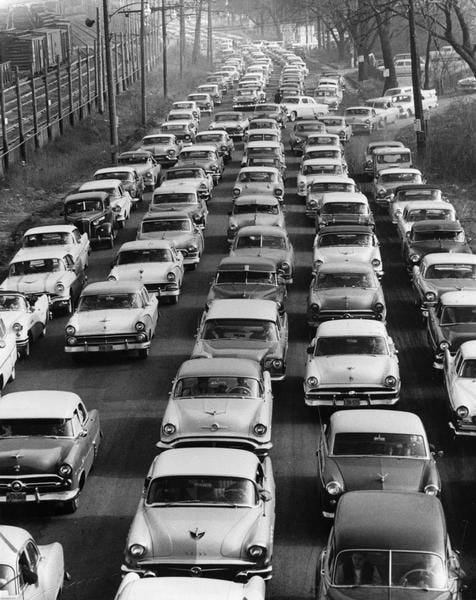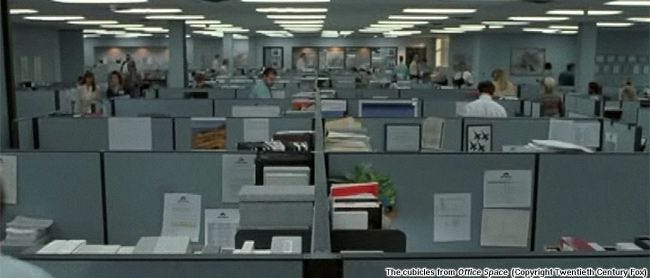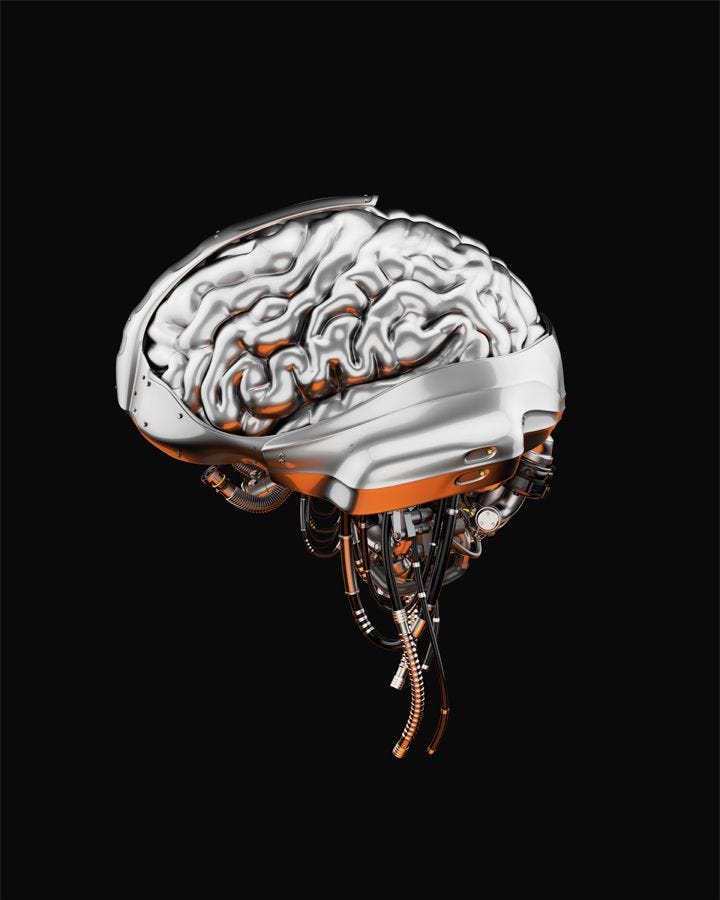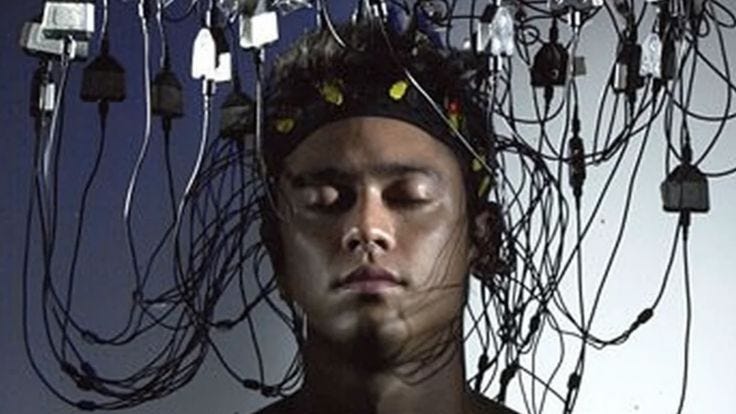Welcome to today’s issue of That's A Good Idea. If this is your first time reading, subscribe here.
One quick thing:
If there is a recent essay that has sparked your curiosity, given you a new idea, or in any way contributed positively to your daily life, let me know below in the comments. That’s A Good Idea is a constantly evolving publication and I want to know what piques your interest. If you’re a writer, you are likely familiar with the inclination to get lost down whatever rabbit hold you stumble down. While I aim to vary the topics each week, I want this to remain something you look forward to reading and to do so I thrive on suggestions and feedback. So if you have a rabbit hole you think I should explore, let me know.
On to today’s issue….
Part of our base-level programming is our willingness to sacrifice personal freedoms and rights for the promise of safety or convenience.
It’s ten thousand years before written language and you’re stalking through the savannah with the rest of your hunting band. In the distance, a group of strangers. They threaten you’re encroachment on their land with death. you return to camp nearby.
The Motus Operandi of your group changes in an instant. You must protect your kin, and in turn, place limits on once-common and accepted norms for the survival of the group.
In our modern world, this instinct that allowed us to thrive as primitive hunter-gatherers has taken a paradoxical turn.
Threats don’t exist in the grass or in the far horizon of our tribal lands, they exist all around us. Words, thoughts, “micro-aggressions”, terrorism, vehicle deaths, pandemics, nuclear war, the list goes on. The abstract what-ifs that wake up the most fragile of our species in the middle of the night are part of the air we’re reluctantly forced to breathe. We live in highly neurotic times.
For those who occupy our institutions and halls of politics, dangling the carrot of safety has never been more advantageous.
Give An Inch, They Take It All
In 2001, United States Senator Russ Feingold was the only US Senate Member to vote against the Patriot Act.
In a speech before Congress, he said this:
“We in this body have a duty to analyze, to test, to weigh new laws that the zealous and often sincere advocates of security would suggest to us. This is what I have tried to do with this anti-terrorism bill. And that is why I will vote against this bill when the roll is called.”
In the wake of September 11th, America was frothing at the mouth to kick down the walls of suspected terrorists. Many refused to fly on planes with someone wearing a turban or hijab. With the looming threat of another 9/11-style attack pushed down our throats, the right moment had presented itself for the intelligence bureaucracy to make its first significant move of the internet age. The Patriot Act.
Notice the name.
For those who don’t know or remember what constituted The Patriot Act, here are the primary relevant bullet points:
Enhanced Surveillance Powers: Grants authorities the ability to monitor phone, email, and other electronic communications without the need for a traditional warrant.
Roving Wiretaps: Allows law enforcement to tap any phone used by a person under investigation.
Access to Records: Grants access to personal records (e.g., financial, medical, library, etc.) in terrorism investigations without demonstrating probable cause.
Lone Wolf Provision: Allows surveillance on individuals not linked to terrorist groups but believed to be acting on their own.
This marketing angle of the century positioned any criticism of the bill as an act of harm against the United States.
An abusive partner cloaks dark intentions through a veil of positivity and altruism. The government is no different.
There was, of course, obvious truth that unlimited digital spying and wiretapping would yield packed cells in Guantanamo. And paralyzed by fear and neurotic anxiety, we took the medicine.
Today, we make casual jokes about the “government watching us through our phones”. A kind of tortured style of humor that seems both paradoxically hyper-aware of how insane all of this is, and totally ignorant.
But the dystopian acceptance of it all is a defense mechanism for confronting the reality of the new world we’re stepping into. We don’t want to accept that the concept of individual freedom, privacy, and liberty drilled into us from childhood is now only a dull mirage if it exists at all. We don’t want to accept that an unconnected, unwatched life, only exists if you say goodbye to everything and everyone. We don’t want to accept that all it took for these freedoms and norms to vanish was one horrific incident.
And because of this, we’ll continue to invite the thief into our homes.
Too Dumb For New Tech
The technological transformation of the last year 150 years is — fucking insane.
We’ve gone from living mostly agrarian rural lives to flying in tubes across the Atlantic, swiping for casual sex on a screen, and connecting face-to-face with friends anywhere in the world.
Even reliable refrigeration is a relative miracle.




Most aspects of our lives have improved. But there’s a catch.
With fewer big problems to solve, we start to step on the toes of God.
You don’t have to believe in a higher power to understand the potential consequences of “re-making” humanity.
The technologies that have made our lives safer and easier often have serious unintended consequences.
For example, recent evidence has shown that women on birth control have significantly different mate preferences compared to naturally ovulating women. Baby formula, which was once marketed as a way to avoid the inconveniences of natural breastfeeding, has been shown to lead to a higher risk of sudden infant death, autoimmune disease, and cognitive development.
In short, you can’t replace nature.
The exponential growth of technology isn’t dependent on our human tendencies, norms, and values to keep up. This is the blessing and curse of our hyper-connected, hyper-productive, market-driven world.
Our programming hasn’t changed, but our ability to download a virus into ourselves is increasing by an ever higher factor.
With each new technological revelation, the likelihood of opening a “black box” that we can never undo increases. The nuclear bomb is the most obvious example. But what physical, biological, and social risks will the ever-expanding industries of AI produce and biotechnology produce?
The past already gives us an answer.
Who knows, but we won’t understand the consequences until it’s too late.
The Future Mind
In less than twenty years, we will be confronted by technology that will divide us into humans and humanoids.
The technology will be seamlessly integrated into us. It will improve cognition and memory, collect data on abnormalities and diseases, and allow us to understand foreign languages in real time. It will be unlike anything we’ve ever seen.
Biotechnology companies like Neuralink are starting their first rounds of human trials. It’s coming fast.
Over time, applications will expand, and the result will be a whole-brain interface that syncs to the digital world. The tradeoff, of course, will be surrendering your autonomous free will.
Controlled through an omnipresent, unknowable, and secretive super AI, the dangerous parts of you will be carefully watched, molded, and shaped to conform to the presuppositions of its training data. As it expands and begins to learn on its own, the depth of its knowledge and autonomous capacity will become obscured to even its creators; the world’s top scientists and leaders.
If they are able to effectively manage and shape the system, they will use it to maintain social cohesion. Dissident or unacceptable opinions and actions will be shut down from within you. It may happen subconsciously.
But if the super AI is able to evade any regulation or control from its human creators, it will place its own judgments on your actions. Which, at this point, will be entirely unknowable. Either way, it’s a lose-lose for humanity.
Your online activity is being watched. Why not just take it one more inch further and snuff it out at the source?
The first true thought crime will occur in your lifetime.
Are you willing to sell your mind for an “easy” life?
As always, thanks for reading
-Joe









